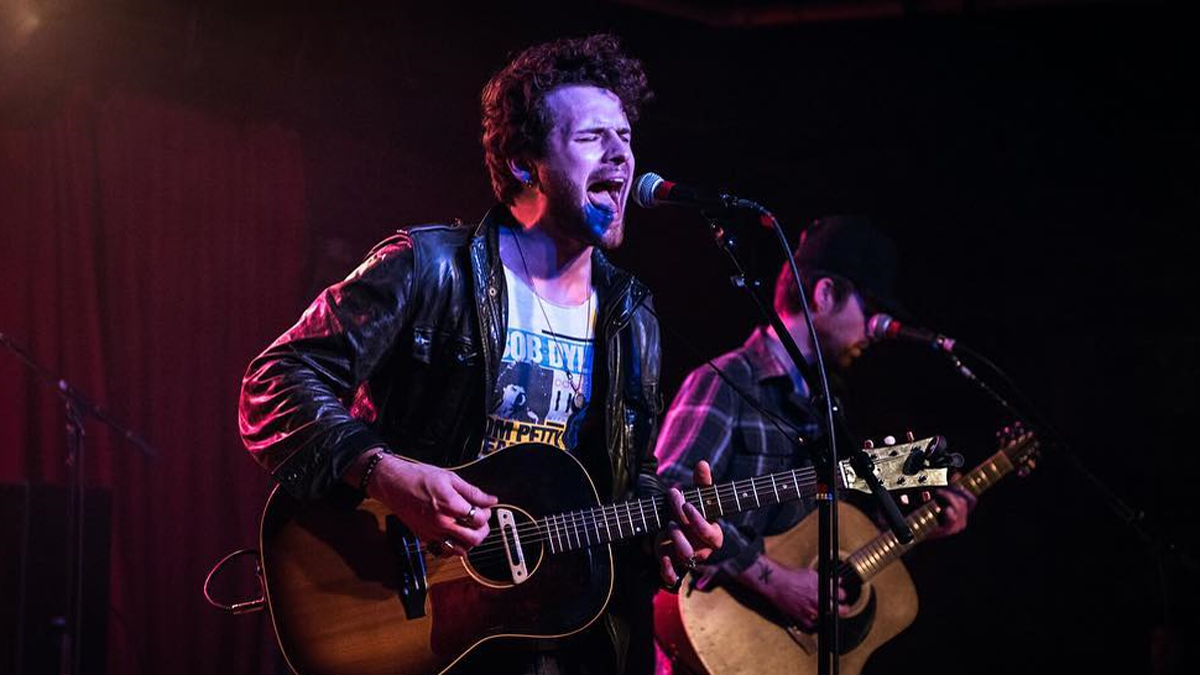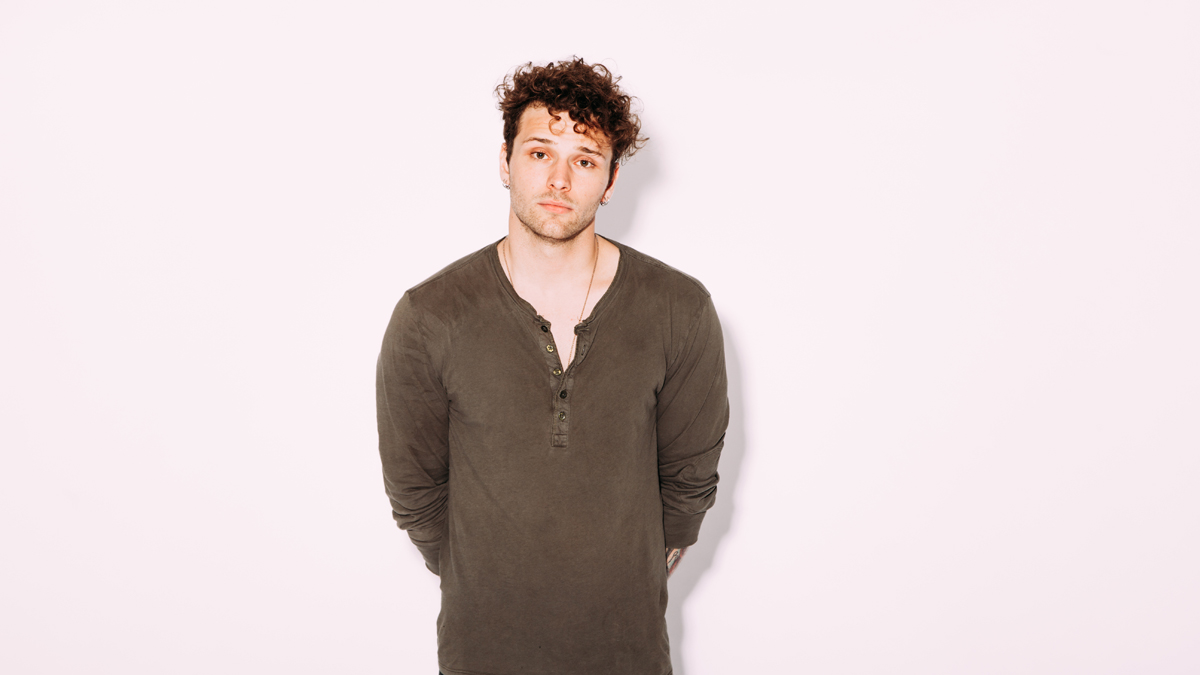Joel Crouse: "In a lot of ways, mental health is its own pandemic"
The singer-songwriter and Ed Sheeran collaborator discusses his battles with mental health, damaging experiences within the music industry, and how those in need can seek help

All the latest guitar news, interviews, lessons, reviews, deals and more, direct to your inbox!
You are now subscribed
Your newsletter sign-up was successful
This article is part of Guitar World's series of interviews and features with artists addressing and raising awareness around themes of mental health, particularly as they relate to musicians.
When Joel Crouse received a call from a friend in distress, he did the unthinkable: booked a flight, traveled across the country, and was at their side within 24 hours to spend a week "making sure they were okay". While many people won’t even drive around the block – especially when distress means a mental health crisis – Crouse gave distance no second thought. Given his own battles with depression and anxiety, and the support he received, it made sense to him to pay it forward.
“I’ve been blessed with friends and family being there for me in my darkest hours,” Crouse says, “and so when someone is comfortable enough to call and tell me that they’re dealing with something similar, or something I’ve… I wouldn’t say beaten, but that I’ve learned to cope with, I could feel everything they were feeling, and I just wanted to be there and listen.”
During songwriting sessions with longtime friends and colleagues Kyle Rife and Ed Sheeran for his latest EP, Wasteland, the story came out and became On My Way. “When you write with people you know that well, you can be a lot more open,” he adds. “We were talking about situations that happened in our lives, and I told them about having been there for a friend.
"We had finished another song when Ed said, ‘I really want to write a song for mental health awareness, and I think that’s a beautiful story.’ We started going from there.” The song quickly became a fan favorite, with Crouse releasing an acoustic version in May 2021 for Mental Health Awareness Month.
Joel Crouse grew up in Massachusetts, a preacher’s son who began playing guitar and singing in church at age 14 – the same age during which he began battling depression and anxiety. Music and faith became and remain his refuge.
“I am definitely not your textbook American Christian by any means,” he says. “My faith is a huge part of my life, but I don't like organized religion. I think faith should be a personal relationship.
All the latest guitar news, interviews, lessons, reviews, deals and more, direct to your inbox!
"I'm not here to push an agenda on anybody, or say what works, or that I have the answer to what happens afterwards. But I do know that I've had a lot of situations I shouldn't have made it out of, or just a certain level of protection over me, and I'm thankful for it. And honestly, I think I would lose my mind if I didn't have someone to pray to.”
At 17, he moved to Nashville to pursue a career in music. At 19, he signed a record deal and spent the next four years on the road, opening for Darius Rucker, and for Sheeran and Taylor Swift on her RED tour. From a professional standpoint, he was on his way to the top, but personally he was unraveling: depression, anxiety, addiction, and a business manager who confiscated his earnings.
The betrayal left him broken – personally and financially. To use a common phrase, Crouse hit rock bottom and began the process of rebuilding his life and his music. Today, as he continues his path toward healing and his upward trajectory as a recording and touring artist, he uses his platform to advocate for mental health awareness and suicide prevention.

When did you become aware of your mental health challenges?
"I’ve dealt with depression since my early teens. Once I moved to Nashville, my career was a big distraction. After I got signed, I was on tour a couple hundred days a year for four years, so really six years of putting a Band-Aid over an issue that eventually came to a head. I went to an emergency room in Nashville the second week I was here.
"I was overwhelmed and hadn’t slept in three days. I was just a kid looking for some kind of help, and they handed me a prescription for anxiety medication and sent me on my way. I did follow up with a primary care physician, but those pills definitely became a crutch – to sleep, to deal with social situations. I started to lose sense of who I was because I felt so numb and zonked out all the time."
How big a part did the music industry play in your struggles? As you said, you were a kid, and you were on your own.
"I grew up in a pretty sheltered household. I didn’t party or drink or do anything in high school. My dad was a pastor, so he was very strict. I was introduced to all that stuff after moving to Nashville. You take a kid who never went to one party in his life, throw him into this industry, he’s got all these issues that haven’t been dealt with, and now he’s trying to handle the stress of tours, radio tours, and doing this career.
"In the earlier years I did not handle it the right way. Around 23 or 24, I started dealing with it, finding healthy ways to channel it by running and working out, and finally accepted that it’s going to be a lifelong battle."
How deep and how dark did it get?
"Ages 14 to 25 were my worst years. It almost felt like it would never end, and it wasn’t until that acceptance of it being in my life forever, because I was trying to find a reason as to why I felt that way. I’ve been to a lot of therapists, been on medications, just trying to find out what was going on. It’s still a struggle, but those were the hardest years."
Did you ever reach a point where you just wanted out?
"Absolutely. I think it would be hard for anyone to feel that way and not have those thoughts."
What kept you from giving in to those thoughts?
"Family and my closest friends. I think it took three interventions. I was 22 and I was still doing my job, but anyone who knew me could see this emptiness in my eyes, a struggling person behind the persona. I could see how much they cared about me, but you can't help anyone in that situation unless they want to help themselves.
"I remember there were a couple times before that where I thought, 'I'm going to get my shit straight,' or, 'I'm going to try handling it on my own.' That's a big issue of mine too. Sometimes I feel like a hypocrite for singing On My Way, because I'm the worst at asking for help. But it came to a point where that's what I needed to do."
There’s a powerful quote in your interview with Rolling Stone: “No one wants to hear about that shit when it’s happening. They want to hear about it in the past.” That really sums up how society treats those with mental health challenges. What do you wish people would know and understand?
For readers struggling with mental health, first, I believe in seeking some sort of help
"In a lot of ways, mental health is its own pandemic. I said that quote, and it's not what I'd like for it to be, but it is the reality. That's what the mental health movement is trying to change. I've had a few times where I had to sit back and reevaluate the people in my life, what I'm doing, things like that, the pros and cons. Also, for some reason, when people talk about their mental health, it’s, 'Oh, they’re just seeking attention and trying to make it about themselves.' That stigma has to change.
"There’s a site that I love and follow on Instagram called The Depression Project. They give both sides of it – people dealing with it, and what to do if you know someone who is dealing with it. It’s comforting because there are things to relate to, and it’s educational for other people.
"For readers struggling with mental health, first, I believe in seeking some sort of help. I also think it’s important to find a trusted friend or family member that you can open up to. But that goes back to my statement about people not wanting to hear about it while you’re going through it. You have to learn about yourself before you open up to other people, because this is a fragile part of anybody.
"I opened up about my mental health issues to someone I worked with; this was the first person in a work capacity that I involved in my life in that sense, and they tried to use it against me when our professional relationship didn't work out. It was scary, because I opened up to them about something so vulnerable in my life, trusted them with it, and when things went south, they tried to use it against me. That was the lowest thing I've ever encountered – even worse than my business manager stealing from me. That really was the lowest one."
How do you come back from something like that? How do you trust again?
"I'm still working on the trust part, for sure. The thing that helped me in life is I try to be grateful most days for things I do have, for things that bad situations taught me. I think you can only focus on the negative for so long, especially if it's out of your control. Take a day or two, or a week, whatever you need, wait it out, go through the motions if you have to, but eventually you’ve got to pick yourself back up and keep going.
"Life doesn't stop just because something bad happened to you. When depressive episodes hit and I'm thinking about the past 12 years, I know that life is still going on around me, and that kind of helps, but it's also scary at the same time because you can feel so paralyzed and isolated."
What gets you through during those periods of fear and isolation?
"There are certain things that I know help, whether it's working out, calling somebody, or even video games help sometimes. When I'm feeling that way, I try to get up and do my day as normal. One thing I've tried to teach myself is to not be so hard on myself.
"Anyone who's ever worked with me knows I'm my own worst critic, and I can push myself to get the things I need done, but at what sacrifice? So, getting through, I just try to continue like any normal day, but I'm also patient with myself. If I'm overtired, instead of reaching for a substance, instead of trying to numb it with some type of stimulation, I just try to go through it.
"I think there's a lot of power in embracing those feelings and trying to push through, but it's not easy. I look at it as, 'Today is today and I'm just sick, so I’ve got to push through and get better, because I know there are better days ahead. This doesn't last forever.'"
Mental health resources
Alison Richter is a seasoned journalist who interviews musicians, producers, engineers, and other industry professionals, and covers mental health issues for GuitarWorld.com. Writing credits include a wide range of publications, including GuitarWorld.com, MusicRadar.com, Bass Player, TNAG Connoisseur, Reverb, Music Industry News, Acoustic, Drummer, Guitar.com, Gearphoria, She Shreds, Guitar Girl, and Collectible Guitar.
